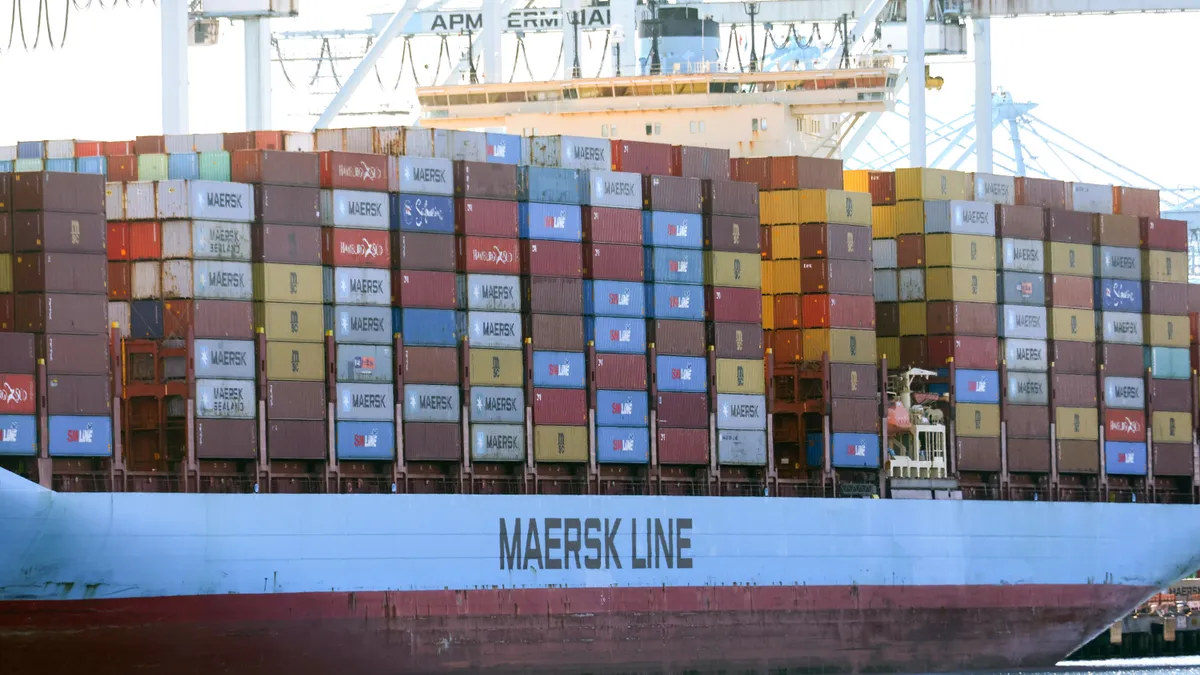The end of a shipping alliance between two of the world's largest container lines could pave the way for more competition and lower rates in ocean shipping.
Maersk and MSC said last month that they would not continue their 2M alliance once it expires in 2025. The vessel-sharing agreement, which began in 2015 and propmpted a wave of consolidation in the industry, allowed the two companies to better manage capacity by pooling cargo.
Although the 2M alliance has drawn scrutiny from federal regulators over potential anticompetitiveness issues, the carriers say they decided to end their agreement as they pursue individual strategies. Maersk, for example, has invested heavily to expand beyond ocean shipping and become an end-to-end supply chain provider.
Experts say that the end of 2M could lead to capacity shifts and spark other carriers to rethink their alliances. Here's what shippers can expect from the end of the world's largest shipping alliance.
Breakup could impact rates, capacity
The end of 2M is likely to prompt some short-term changes to capacity and price.
The break up is expected to spark increased competition from ocean carriers and will have other companies rethinking their alliances, Lars Jensen, CEO and Partner at Vespucci Maritime, wrote in an email to Supply Chain Dive.
Increased competition could lead to lower rates. Once the alliance ends, shippers will have the choice between Maersk, MSC or another carrier — which could push shipping companies to fight over customers.
"In the short term (i.e. 2023) this will mean increased competitive pressure between the carriers which all else equal results in rates that are lower than they otherwise would have been," Jensen said.
Those lower rates, however, could come at the expense of more volatile service and a higher number of blank sailings, he added.
MSC and Maersk's split could also spark other carriers to rethink their alliances, which would further roil rates and capacity.
“Other global carriers will be looking at the changing landscape and consider whether their own current alliance memberships is the right thing for them in the long-term,” said Jensen.
Maersk and MSC’s separate paths
Breaking up 2M also means that Maersk will become a significantly smaller player in the ocean industry. A Sea-Intelligence report found that post-alliance, Maersk will have an operating capacity matching the combined niche carriers.

The shakeup in the ocean shipping industry comes as Maersk pursues a strategy positioning the company as an end-to-end supply chain provider. The company has acquired a number of logistics firms over the years in areas including fulfillment and trucking.
MSC, meanwhile, has doubled down on ocean shipping. The company upped its capacity through new vessel orders and by "aggressively raiding the second-hand and charter markets," according to a Drewry report.
"It certainly feels like the end of 2M was initiated by MSC, which seems better equipped for independent living than its partner," Sean Heaney, senior manager of container research at Drewry, said in a report.
Ending the alliance will push Maersk to double down further on services beyond ocean shipping. Because of its size, it's unlikely the carrier could join another ocean alliance without drawing scrutiny from regulators.
"Maersk has invested so much money and effort to the integrator strategy that it is hard to see it backing down now," Heaney said.













